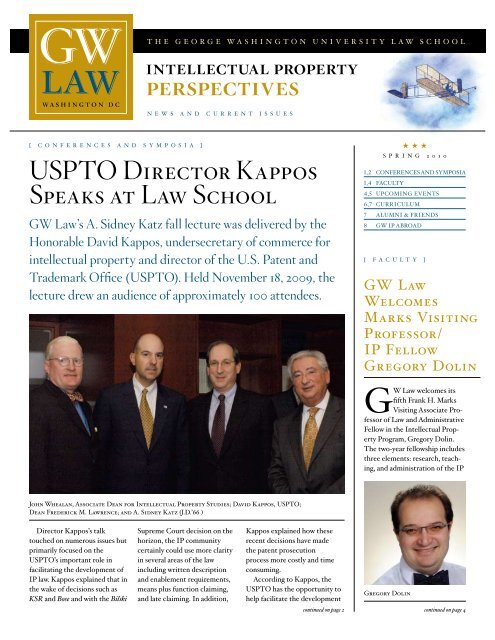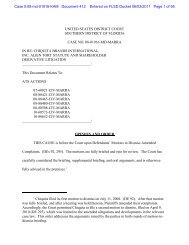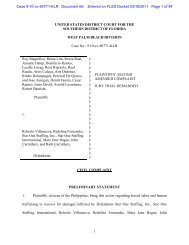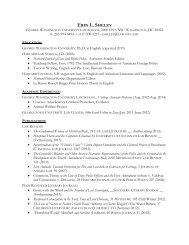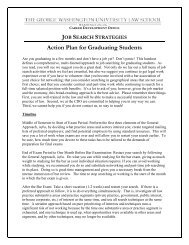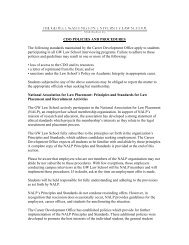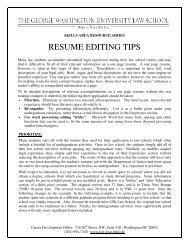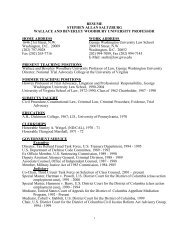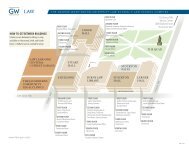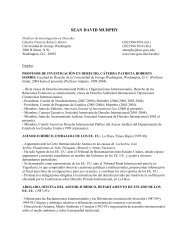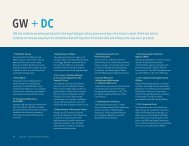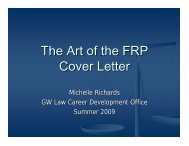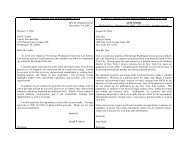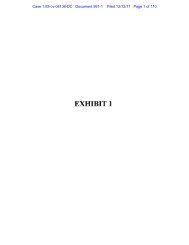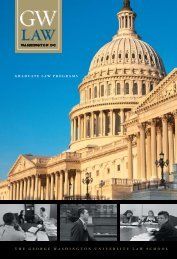perspectives - George Washington University Law School
perspectives - George Washington University Law School
perspectives - George Washington University Law School
Create successful ePaper yourself
Turn your PDF publications into a flip-book with our unique Google optimized e-Paper software.
the <strong>George</strong> <strong>Washington</strong> <strong>University</strong> <strong>Law</strong> <strong>School</strong>intellectual property<strong>perspectives</strong>N e w s a n d c u r r e n t i s s u e s[ C o n f e r e n c e s a n d S y m p o s i a ]USPTO Director KapposSpeaks at <strong>Law</strong> <strong>School</strong>GW <strong>Law</strong>’s A. Sidney Katz fall lecture was delivered by theHonorable David Kappos, undersecretary of commerce forintellectual property and director of the U.S. Patent andTrademark Office (USPTO). Held November 18, 2009, thelecture drew an audience of approximately 100 attendees.s p r i n g 2 0 1 01,2 Conferences and Symposia1,4 faculty4,5 Upcoming events6,7 curriculum7 alumni & friends8 GW IP Abroad[ F A C U L T Y ]GW <strong>Law</strong>WelcomesMarks VisitingProfessor/IP FellowGregory DolinGW <strong>Law</strong> welcomes itsfifth Frank H. MarksVisiting Associate Professorof <strong>Law</strong> and AdministrativeFellow in the Intellectual PropertyProgram, Gregory Dolin.The two-year fellowship includesthree elements: research, teaching,and administration of the IPJohn Whealan, Associate Dean for Intellectual Property Studies; David Kappos, USPTO;Dean Frederick M. <strong>Law</strong>rence; and A. Sidney Katz (J.D.’66 )Director Kappos’s talktouched on numerous issues butprimarily focused on theUSPTO’s important role infacilitating the development ofIP law. Kappos explained that inthe wake of decisions such asKSR and Bose and with the BilskiSupreme Court decision on thehorizon, the IP communitycertainly could use more clarityin several areas of the lawincluding written descriptionand enablement requirements,means plus function claiming,and late claiming. In addition,Kappos explained how theserecent decisions have madethe patent prosecutionprocess more costly and timeconsuming.According to Kappos, theUSPTO has the opportunity tohelp facilitate the developmentGregory Dolincontinued on page 2continued on page 4
[ C o n f e r e n c e s a n d S y m p o s i a ]2ip <strong>perspectives</strong>continued from page 1of the law through decisions ofthe Board of Patent Appeals andInterferences and the TrademarkTrial and Appeal Board. “Weintend to identify test cases andpromptly decide those cases sothat the community can getclarity earlier,” he noted. Hefurther explained that theUSPTO’s reviewing court, theU.S. Court of Appeals for theFederal Circuit, plays a pivotalrole in shaping the law byreviewing those board decisionsthat applicants choose to appeal.He concluded, “The USPTO isgoing to make sure the boardissues decisions that will set goodprecedent and that can, inconjunction with Federal Circuitdecisions, set the proper balanceand provide answers on thechallenging legal questions thatface the IP community.”Director Kappos has strongties to GW <strong>Law</strong>. Although heearned his law degree from the<strong>University</strong> of California atBerkeley in 1990, he receivedspecial permission to spend histhird year of law school at GW<strong>Law</strong> in order to take severalpatent and IP-related courses.In addition, he recently joinedGW <strong>Law</strong>’s IP Advisory Board.The Katz lecture, held twice ayear, is generously endowed byA. Sidney Katz (J.D. ’66).For information on futureKatz lectures or otherGW <strong>Law</strong> IP-related events,visit our website atwww.law.gwu.edu/ipevents.GW <strong>Law</strong>’s Fall 2009 IP Lecture Series a SuccessChristopher Cotropia presented “The Folly of Early Filing inPatent <strong>Law</strong>.”GW <strong>Law</strong>’s IP Program hostedfive speakers as part of its IPSpeaker Series during fall 2009.The series presenters discussed arange of topics covering patents,trademarks, and copyright.IP <strong>perspectives</strong>IP Perspectives is published by theIntellectual Property <strong>Law</strong> Programat The <strong>George</strong> <strong>Washington</strong><strong>University</strong> <strong>Law</strong> <strong>School</strong>.Questions or commentsshould be sent to:John Whealanjwhealan@law.gwu.edu202.994.2195The <strong>George</strong> <strong>Washington</strong><strong>University</strong> <strong>Law</strong> <strong>School</strong>Intellectual Property <strong>Law</strong> Program2000 H Street, NW<strong>Washington</strong>, DC 20052iplaw@law.gwu.eduwww.law.gwu.edu/IPCritique and commentary ofeach speaker’s paper and aquestion-and-answer sessionfollowed each presentation.The series kicked off withDennis Crouch, associateprofessor at the <strong>University</strong> ofMissouri <strong>School</strong> of <strong>Law</strong> and hostof a well-known patent law blog,Patently-O. Professor Crouchpresented his paper, “Is NoveltyObsolete? Chronicling theIrrelevance of the InventionDate in U.S. Patent <strong>Law</strong>,” inwhich he discussed the uniquenessof the American “first-toinvent”system (as opposed to a“first-to-file” system that is usedin other countries) and analyzedwhether the system served itsstated goals of protecting thesmall inventor. He presentedempirical data on interferenceproceedings participants and,based on the data, suggested thatmore often large corporationsrather than small inventors usedthe “first-to-invent” system totheir benefit.Edward Walterscheid, avisiting scholar at GW <strong>Law</strong> and arecognized and often-citedexpert on the history of patentlaw, presented his paper “JustifyingHotchkiss: The Quest toGround the Introduction ofNon-Obviousness into Patent<strong>Law</strong>.” In the paper, he delvesdeeply into the history of theAmerican obviousness doctrine.Following the presentation, GW<strong>Law</strong> Professor John F. Duffycommented on Mr. Walterscheid’sthesis.Zahr Stauffer, visiting assistantprofessor at <strong>University</strong> ofVirginia <strong>School</strong> of <strong>Law</strong>, discussedembedded advertising in TVshows and its regulation.Professor Stauffer advanced thethesis that the current regulationsare obsolete and do nothelp protect consumers, in largepart as a result of the easyavailability of informationthrough new media like theInternet. Professor EllenGoodman from Rutgers<strong>University</strong> <strong>School</strong> of <strong>Law</strong> offeredcritique of Professor’s Stauffer’spaper.Joe Miller, assistant professorat the Lewis and Clark <strong>Law</strong><strong>School</strong>, discussed the nature andscope of the USPTO’s regulatorypower. The topic was quitecurrent, as the Federal Circuitrecently handed down itsdecision in Tafas v. Kappos, a casethat addressed the scope ofUSPTO’s authority to issuesubstantive rules. ProfessorMiller opined that the currentdichotomy between proceduraland substantive rules does notcreate any clarity in the law andthat a new approach is needed.GW <strong>Law</strong> Professor John F.Duffy provided critique andcommentary.The series closed with apresentation by Chris Cotropia,professor of law at the <strong>University</strong>of Richmond <strong>School</strong> of <strong>Law</strong>.In his paper, “The Folly of EarlyFiling in Patent <strong>Law</strong>,” he arguedthat the current patent system –which encourages filing patentapplications long before it isclear that there is a market forthe invention—actually contributesto the backlog that theUSPTO currently experiences.He suggested that an alternative,tiered system in which therewould be separate fees for filingand examination would reducethe backlog and allow applicantstime to determine whether apatent application is worthprosecuting from an economicstandpoint. Professor MichaelAbramowitz provided critiqueand commentary.The IP Speaker series willcontinue in the spring 2010semester with five new speakers.(See page 3 for the story)
Bilski v. Kappos: GW <strong>Law</strong>Hosts Post-Supreme CourtArgument DiscussionThe Supreme Court heard oralarguments in the high-profilepatent case Bilski v. Kappos onNovember 9, 2009, and twomembers of GW <strong>Law</strong>’s faculty,John F. Duffy and F. Scott Kieff,authored amicus briefs. Due tothe high interest in the case fromthe bar and the general public,the seating at the Court wasextremely limited. In order toallow GW <strong>Law</strong> students, alumni,and friends an opportunity forinsight into the argument, the<strong>Law</strong> <strong>School</strong> hosted a paneldiscussion of the case and theoral argument, where three IPprofessors who attended theSupreme Court session sharedtheir views.Professor Duffy, ProfessorPamela Samuelson of UC Berkley<strong>School</strong> of <strong>Law</strong>, and ProfessorKevin Collins of Indiana<strong>University</strong>-Bloomington Mauer<strong>School</strong> of <strong>Law</strong> provided theircommentary on the case, the oralargument, and the justices’questions, and they shared theirpredictions on the likelyoutcome of the case. JohnWhealan, GW <strong>Law</strong> associatedean for intellectual property,moderated the discussion. Morethan 100 were in attendance forthe event, which was held inJacob Burns Moot Courtroom.The Supreme Court isexpected to hand down itsdecision before adjourning inJuly 2010. GW <strong>Law</strong> will discussthe impact of the decision duringa panel discussion at its upcomingSymposium on IntellectualProperty <strong>Law</strong>. (See story onpage 5)Golan v. Holder: GW <strong>Law</strong>Co-hosts Panel Relatedto Copyright ActIn January 2010, GW <strong>Law</strong>’s IPprogram and the D.C. Chapterof the Copyright Society ofthe U.S.A. co-hosted a paneldiscussion of Golan v. Holder,a case that challenged theconstitutionality of a provision inthe Copyright Act. The panel wastimed to coincide with the TenthCircuit’s preparation to hear oralargument of the appeal from theDistrict Court ruling.The original ruling was madein April 2009 when the U.S.District Court for the District ofColorado did something that nocourt had ever done in the220-year history of federalcopyright law: In Golan v. Holder,the court held that part of theCopyright Act—a provisiongranting copyright protection tosome foreign works that hadpreviously been in the publicdomain—violated the FirstAmendment.For the discussion, GW <strong>Law</strong>and its co-host assembled a panelof distinguished experts on theGolan case and the legal andconstitutional issues it raises.The panel, moderated by GW<strong>Law</strong> Professor Robert Brauneis,included David Lange, theMelvin G. Shimm professor oflaw at Duke <strong>Law</strong> <strong>School</strong>; EricSchwartz, partner at MitchellSilberberg & Knupp LLP;Edward Lee, professor of law atthe Moritz College of <strong>Law</strong> atSpring IP Speaker SeriesThis spring, GW <strong>Law</strong>’sDean Dinwoodey Centerfor Intellectual PropertyStudies presented fiveoutstanding luncheonlectures by IP scholarsfrom around the country.Each event began at noon and included lunch and the speakers’presentation and discussion of their current research.Wednesday, January 20Faculty Conference Center, 5th Fl. BurnsLaura Heymann, Associate Professor, William & Mary <strong>Law</strong><strong>School</strong>; “Naming, Identity, and Trademark <strong>Law</strong>”Wednesday, February 3Faculty Conference Center, 5th Fl. BurnsMichael Ryan, Director, Creative and Innovative EconomyCenter, GW <strong>Law</strong>; “Patent Incentives, Technology Markets, andPublic-Private Bio-Medical Innovation Networks in Brazil”Wednesday, February 10Faculty Conference Center, 5th Fl. BurnsAbraham Drassinower, Associate Professor, <strong>University</strong>of Toronto <strong>Law</strong> <strong>School</strong>; “What’s Wrong With Copying?”Wednesday, February 24Faculty Conference Center, 5th Fl. BurnsJonathan Zittrain, Professor, Harvard <strong>Law</strong> <strong>School</strong>;“Minds for Sale”Wednesday, March 24Tasher Great Room, 1st Fl. Burns LibraryMark Janis, Professor, Indiana <strong>University</strong> Maurer <strong>School</strong>of <strong>Law</strong>; “Daniel Webster’s Patent Cases”All are welcome to attend these lunch presentations, which aregenerously made possible by a gift from the Bureau of NationalAffairs (BNA). Details for future lunches (including how toR.S.V.P.) can be found at http://www.law.gwu.edu/ipevents.Ohio State <strong>University</strong>; andChristopher Mohr, member ofMeyer, Klipper & Mohr, PLLC.A large audience in the MootCourt Room heard the panelistsexplore the arguments that werelikely to occupy the TenthCircuit and that may well occupythe Supreme Court if, as somepanelists expect, the case isheaded in that direction. Thepanel provoked lively debateamong attendees following theformal presentation.An audio podcast of the paneldiscussion is available at http://www.law.gwu.edu/Academics/FocusAreas/IP/Pages/Podcasts.aspx. ★3ip <strong>perspectives</strong>
[upcoming events][ F A C U L T Y ]4ip <strong>perspectives</strong>Upcoming IP Alumniand Friends ReceptionsThe IP Program will continue to host IP Alumni and Friendsreceptions at major IP conferences. Upcoming events include:BIO: Tuesday, May 4, 20106pm-8pmat Brasserie Jo (Chicago)INTA:Further details will be available on the GW IP events webpageand the GW IP group page on LinkedIn atwww.linkedin.com/groups?gid=90887.Features:• Search the Alumni Directory• Update Your Information• Manage Your Directory Listing• Register for Events• Join Groups Based on PracticeArea and Geographic Region• Share Your Class NotesMonday, May 24, 20105:30pm-7:30pmat Top of the Hub & Skywalk (Boston)the <strong>George</strong> <strong>Washington</strong> <strong>University</strong> <strong>Law</strong> <strong>School</strong>GW <strong>Law</strong> announces its newOnline Alumni Communityhttp://www.law.gwu.edu/Alumnicontinued from page 1program. The Marks IP Fellowteaches one course per academicyear and assists with administrationof the Dean DinwoodeyCenter for Intellectual PropertyStudies, which includes bringingin speakers for the IntellectualProperty Workshop Series andorganizing other speakers andevents. In addition, the MarksIP Fellow has the opportunityto pursue a scholarly project andprepare to enter the law teachingmarket, normally in the fallsemester of the second year.Professor Dolin joins GW <strong>Law</strong>following a clerkship with JudgePauline Newman of the U.S.Court of Appeals for the FederalCircuit. Previously, he served as aJohn M. Olin Fellow in <strong>Law</strong> atthe Northwestern <strong>University</strong><strong>School</strong> of <strong>Law</strong>, was a law clerk tothe late Hon. H. Emory Widener,Jr. of the U.S. Court ofAppeals for the Fourth Circuit,and was an associate in theintellectual property group ofKramer Levin Naftalis andFrankel LLP.Professor Dolin received a J.D.cum laude from the <strong>George</strong>town<strong>University</strong> <strong>Law</strong> Center, an M.D.with recognition from State<strong>University</strong> of New York at StonyBrook, and a B.A. with honorsfrom The Johns Hopkins<strong>University</strong>. He is currentlyteaching TRIPS, Patents, andPublic Health both at GW <strong>Law</strong>’shome campus during the spring2010 semester and at GW <strong>Law</strong>’sMunich Intellectual PropertySummer Program during the2010 session.“We are very excited to haveGreg as our Marks IP Fellow forthe next two years. Greg’s uniquebackground in patent law andmedicine, as well as his clerkshipexperience with two differentcircuit courts, adds greatly to ourIP program,” commented JohnWhealan, associate dean forintellectual property law studies.The Marks IP Fellowship isendowed by Frank H. Marks,(LL.B ’26, M.S. ’23, B.S. ’21), apatent attorney who started hiscareer as an examiner for the U.S.Patent Office before joining theChicago law firm of Livingston,Kahn & Adler, where for manyyears he represented SearsRoebuck & Co. in all of its legalpatent work. The endowmentwas meant to honor Mr. Marks’slate first wife Doris NordgrenMarks and his second wife HazelKraus Marks, who passed awayshortly after Mr. Marks’ death in1994. Mr. Marks’ generosityenabled GW <strong>Law</strong> to create afellowship that allows younglawyers aspiring to a career inacademia to receive teachingexperience and an opportunity towork on a scholarly agenda.With the program now in itsseventh year, GW <strong>Law</strong> is proudof the placements of previousfellows, all of whom are currentlyin academic positions. LauraHeymann is assistant professorat William and Mary <strong>School</strong> of<strong>Law</strong>; Laura Bradford is assistantprofessor of law at <strong>George</strong>Mason <strong>University</strong> <strong>School</strong> of <strong>Law</strong>;and Shamnad Basheer wasrecently appointed the ministryof human resource developmentchair in intellectual property atthe National <strong>University</strong> ofJuridical Sciences, Kolkata,India. Last year’s fellow, SarahRajec, is currently a law clerk tothe Hon. Alan D. Lourie of theU.S. Court of Appeals for theFederal Circuit and plans toenter the teaching market in fall2010. (See story on page 5)The next Marks IP Fellowshipwill run from summer 2011 tosummer 2013. Review ofapplications for this positionwill begin in fall 2010 and willcontinue until the position isfilled. More information onapplying can be found on theIntellectual Property athttp://www.law.gwu.edu/IP.
Former Marks IPFellow Clerks at theFederal Circuit[upcoming events]C.J. Michel Will GiveLuncheon Address atGW <strong>Law</strong> IP Symposium5ip <strong>perspectives</strong>Sarah Rajec, former MarksIP Fellow, has been hired as alaw clerk at the U.S. Court ofAppeals for the Federal Circuit.This is her second clerkship;she previously clerked for JudgeDonald C. Pogue at the U.S.Court of International Tradeand served as an associate inpatent litigation at Fish &Richardson, PC, in Boston.Dean Whealan commented,“Everyone here at GW <strong>Law</strong>loved working with Sarah. I amcertain she will make a fine lawclerk and an excellent IPteacher when she returns toacademia.” We wish her all thebest in her new position.Dean Whealan Arguesen banc Case BeforeFederal CircuitJohn WhealanJohn Whealan, associatedean for intellectual propertylaw studies, argued before an enbanc sitting of the FederalCircuit in the case of Ariad v.Lilly on December 7, 2009. Theissue involved the properconstruction of Section 112,Paragraph 1 of the Patent Actand, in particular, the interplaybetween the court’s currentSarah Rajecprecedent on “written description”and “enablementrequirements.” For over adecade, judges of the FederalCircuit, leading patentacademics, and members of thepatent bar have debated thisissue. This is the first time theFederal Circuit will considerthe issue en banc.Whealan, along with GW<strong>Law</strong> Professor John F. Duffy,successfully petitioned theFederal Circuit earlier in theyear on behalf of Ariad to hearthe case en banc. On March 22,the court issued its opinion,ruling 9-2 to maintain aseparate “written description”requirement. Both Whealanand Duffy represented Ariad intheir personal capacities.Several students attended theargument, led by IP FellowGreg Dolin. ★The second annual GW <strong>Law</strong> Symposium on Intellectual Property<strong>Law</strong> will be held on Tuesday, May 11 at the <strong>Law</strong> <strong>School</strong>. Co-sponsoredby GW <strong>Law</strong>, Howrey LLP, and Cornerstone Research, thesymposium will bring together leaders from private practice, thejudiciary, government, economic consulting groups, and academiato address current issues and recent developments in intellectualproperty law.The topics covered will include: (a) tips and trends for litigatingin the busiest patent courts in the U.S., (b) the interplay between“written description” and “enablement,” (c) the strategic managementof an IP portfolio, and (d) industry <strong>perspectives</strong> on Bilski v.Kappos.Confirmed speakers include:nHon. Paul R. Michel, U.S. Court of Appeals for the Federal CircuitnHon. Jeremy Fogel, U.S. District Court for the Northern Districtof CalifornianHon. Marilyn L. Huff, U.S. District Court for the SouthernDistrict of CalifornianHon. David Kappos, U.S. Patent and Trademark OfficenHon. Q. Todd Dickinson, AIPLAnHans Sauer, BIOnAmy Hamilton, Eli Lilly & CompanynJohn Cheek, Caterpillar, Inc.nJeff Ranck, Microsoft CorporationnKirk Dailey, Motorola, Inc.nShailendra Bhumralkar, SAPnKevin Kramer, Yahoo!, Inc.nJohn F. Duffy, GW <strong>Law</strong>nF. Scott Kieff, GW <strong>Law</strong>nMatt Wolf, Howrey LLPnLloyd “Rusty” Day, Howrey LLPnWillem Hoyng, Howrey LLPMore information can be found at http://www.law.gwu.edu/ipevents.
[ c u r r i c u l u m ]6Giles Rich Moot Court Competition Sets Participant Recordsip <strong>perspectives</strong>Jordan Faux, Benjamin Roberts, Hon. Edward Damich, Hon. RandallRader, John Whealan, Kevin McGrath, and Daniel TuckerA record number of teamscompeted in GW <strong>Law</strong>’s 2010Giles S. Rich Moot CourtCompetition, a nationalcompetition run by GW <strong>Law</strong>.It is one of several GW <strong>Law</strong>moot court competitions forwhich students may receivecredit. This year, 28 GW teamscompeted. Judges for thepreliminary rounds includedfaculty, alumni, current andformer Federal Circuit clerks,former winners of the competition,and other friends of the IPprogram. The preliminary roundsproduced two final teams: KevinMcGrath and Daniel Tucker, andJordan Faux and BenjaminRoberts.The final round of thecompetition was held in theJacob Burns Moot Court Roomon January 19th and was presidedover by the Honorable RandallR. Rader (J.D. ’78), circuit judgeof the U.S. Court of Appeals forthe Federal Circuit; the HonorableEdward Damich, judge ofthe U.S. Court of Federal Claims;and John Whealan, associatedean of intellectual property lawstudies at GW <strong>Law</strong>. A standingroomonly crowd of more than100 people attended the finalround, which was followed by areception. The competition wasextremely close and was won bythe team of Kevin McGrath andDaniel Tucker.Additional awards went to:Best Team Brief1 Kevin McGrath andDaniel Tucker2 Jordan Faux andBenjamin Roberts3 Beverly Chang andKelvin VargheseBest Oralist1 Willow Noonan2 Christian Kesselring3 Jordan FauxBest Overall Score1 Jordan Faux2 Daniel Tucker3 Willow NoonanBoth final teams—McGrathand Tucker, and Faux andRoberts—were invited to join theMoot Court Board. In addition,both teams will be sponsored bythe GW <strong>Law</strong>’s IP program andthe GW <strong>Law</strong> Moot Court Boardas they compete in the regionalcompetition in Boston thisMarch. Dean Whealan hasoffered to coach both teams.We congratulate all the winnersand wish the two teams that aremoving on the best of luck in theregional competition.Third Section of Patent <strong>Law</strong> Added for Summer 2010Professor F. Scott Kieff, whojoined GW <strong>Law</strong>’s faculty last fall,will teach a newly added thirdsection of patent law thissummer. The added section willallow 2Ls who take the course toregister for advanced patentcourses the following fall. Twoother sections of patent law willcontinue to be offered, one in thefall, taught by Judge Randall R.Rader (J.D. ’78) of the U.S. Courtof Appeals for the FederalCircuit, and one in the spring,taught by Professor John F.Duffy. Associate Dean JohnWhealan commented, “This issimply a testament to thestrength of our outstanding IPprogram that we will now offerstudents three sections of patentlaw taught by Duffy, Kieff, andRader, respectively.”GW Cyberlaw Student Association Connects Students,Technology, and <strong>Law</strong>As computers becomeincreasingly involved in our dailylives, we find that novel legalissues inevitably challengetraditional applications of thelaw. From issues such as the useof computers as instruments intraditional crimes, such as wirefraud or theft, to the Internet’srole in First Amendment speech,the law has found itself repeatedlyoutpaced by technology. Arecently formed student group atGW <strong>Law</strong> aims to preparetomorrow’s attorneys to recognizeand confront these problemswherever technology and the lawintersect.The GW Cyberlaw StudentAssociation was created in 2007as a forum to discuss legal issuesspanning a broad spectrum oftopics. The organization aims toraise awareness of cyberlaw issuesand enable students to pursuecareers in an area of technologylaw interesting to them. “Ourdefinition of ‘cyberlaw’ is verybroad, including anythinginvolving the intersection ofcomputers or the Internet andthe law,” according to Andy Blair,continued on page 7
[ a l u m n i & f r i e n d s ]continued from page 6current president of theassociation. “From e-voting toWall Street to criminaldefense, students will encounterlegal challenges involvingtechnology in almost anycareer they choose. Our goal isto raise awareness of thosechallenges and spark aninterest in students to tacklethem.”Speaking events and paneldiscussions have been theprimary means of exposingstudents to cyberlaw issues.Students are also encouragedto take advantage of themyriad opportunities availableonly in D.C., such as theannual State of the Netconference hosted by theCongressional InternetCaucus. Events hosted at GW<strong>Law</strong> have brought togetherpractitioners and academics indiscussions on wide-rangingtopics such as video games, netneutrality, and digital copyrights.In fall 2009, WilliamPatry, senior copyright counselat Google and respectedcopyright treatise author,spoke about problems facingdigital content industries andhis <strong>perspectives</strong> on solutions.GW <strong>Law</strong> Professor DawnNunziato discussed netneutrality and the FirstAmendment.Events planned for spring2010 include discussions oflegal issues regarding virtualgoods; the FCC’s broadbandplan; and cyberlaw-relatedpublic interest, law firm, andgovernment opportunities. Forinformation on upcoming GW<strong>Law</strong> and D.C.-area cyberlawevents, visithttp://www.gwcyberlaw.org. ★Join GW IP Group on LinkedInAre you a member of LinkedIn?The GW <strong>Law</strong> IP Program hasestablished a LinkedIn group,The <strong>George</strong> <strong>Washington</strong><strong>University</strong> <strong>Law</strong> <strong>School</strong> IntellectualProperty Community, whichis designated “GW IP.” Thegroup, which currently has morethan 400 members, allowsalumni and friends of GW <strong>Law</strong>’sIP program to network and learnabout upcoming <strong>Law</strong> <strong>School</strong> IPevents. If you would like to join,please indicate to Prof. RobertBrauneis, the group manager,your affiliation with GW <strong>Law</strong>’sGW IP Program Hosts Receptionat Annual AIPLA meeting in DCThe IP program hostedalumni, friends, and faculty at areception during the AIPLAannual meeting in <strong>Washington</strong>,D.C., last fall. The October 15happy hour gave participants theopportunity to learn more aboutthe newly created GW <strong>Law</strong> IPAlumni Interest Group. Approximately75 guests enjoyedcomplimentary cocktails, horsd’oeuvres, and giveaways. RobertGW Loses Member of IP Family,Maurice H. KlitzmanMaurice (Maury) Klitzman(1920-2010), a 1951 GW <strong>Law</strong>graduate and adjunct professorat GW <strong>Law</strong> from 1976 to 1990,passed away in January of thisyear. After graduating fromGW <strong>Law</strong>, Maury worked at theUSPTO, U.S. Air Force, andGeneral Electric beforebecoming one of the country’sleading corporate patentattorneys at IBM. There, hetrained generations of IBMpatent attorneys, including thecurrent director of theUSPTO, David Kappos. Alongwith USPTO representativesand a small group of IPlawyers, he founded theNational Inventors Hall ofFame and Museum in Alexandria,VA, in 1973. ThroughoutIP Program. Alumni should mentionthe year they graduated, andother friends of GW <strong>Law</strong>’s IPprogram should note the <strong>Law</strong><strong>School</strong> faculty member whoinvited them to join the group.The GW IP group can be foundat www.linkedin.com/groups?gid=90887Brauneis, professor and co-directorof the IP Program, and JohnWhealan, associate dean forintellectual property law studies,greeted alums and friends of theGW <strong>Law</strong> IP Program. (Theywould like to especially thank1999 GW <strong>Law</strong> alum Arlir Amado,who assisted in organizingthis event.)The GW IP program will hostsimilar happy hours in conjunctionwith major meetings of barassociations including AIPLA,INTA, BIO, and IPO. Furtherinformation about these eventscan found at the IP Events pageat www.law.gwu.edu/ipevents andon the GW IP group page ofLinkedIn.Please see related info on BIOand INTA receptions on page 4.his career and even intoretirement, Maury played anactive role in helping shapepatent policies of the AmericanIntellectual Property <strong>Law</strong>Association where, for manyyears, he had been a prominentmember of the association’sAmicus Committee. It is withsadness that we note Maury’spassing. ★7ip <strong>perspectives</strong>
[ g w i p a b r o a d ]8ip <strong>perspectives</strong>IP Munich Summer Program To Be Held in June and JulyThe GW <strong>Law</strong> MunichSummer Program in IntellectualProperty will be held during twosessions, from June 28 throughJuly 10 and from July 12 throughJuly 24, 2010. The program offersa unique experience in IP law byallowing students to study IP atthe Max Planck Institute forIntellectual Property in Munich.The program consists of eightone-credit courses taught over afour-week period by IP professorsfrom GW <strong>Law</strong> and fromaround the world. The programis open to GW <strong>Law</strong> students aswell as to law students fromother U.S. and foreign lawschools. Classes are typicallysmall seminars, and students areable to take courses and learnfrom professors they may notordinarily be able to take duringthe normal academic year at GW<strong>Law</strong> in <strong>Washington</strong>, DC. Thisyear’s courses are listed below.1st SessionJune 28th – July 10th:nCross-Border Trade inIntellectual PropertyDan Burk, <strong>University</strong> ofCalifornia-IrvinenTechnical Protection ofAuthors’ RightsEdward Damich, U.S. Court ofFederal ClaimsnThe Federal CircuitJohn Whealan, GW <strong>Law</strong>nComputer CrimeOrin Kerr, GW <strong>Law</strong>2nd SessionJuly 12th – July 24:nTheoretical Foundations of IPMichael Madison, <strong>University</strong>of PittsburghnInternational Patent <strong>Law</strong>Margo Bagley, <strong>University</strong>of VirginianIP and Indigenous HeritageSilke von Lewinski, MaxPlanck InstitutenTRIPS, Patents, andPublic HealthGreg Dolin, GW <strong>Law</strong>Additional information can befound on the GW <strong>Law</strong> web siteat http://www.law.gwu.edu/munichsummer.Printed on recycled paper containing 30% post-consumer waste. G30601IP <strong>Law</strong> Program700 20th Street, N.W.<strong>Washington</strong>, DC 20052FIRST CLASSU.S. PostagePAID<strong>Washington</strong>, D.C.Permit #593


